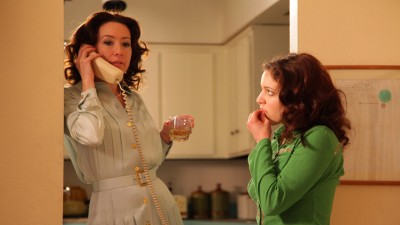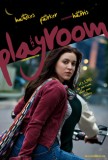| Reviews & Columns |
|
Reviews DVD TV on DVD Blu-ray 4K UHD International DVDs In Theaters Reviews by Studio Video Games Features Collector Series DVDs Easter Egg Database Interviews DVD Talk Radio Feature Articles Columns Anime Talk DVD Savant Horror DVDs The M.O.D. Squad Art House HD Talk Silent DVD
|
DVD Talk Forum |
|
|
| Resources |
|
DVD Price Search Customer Service #'s RCE Info Links |
|
Columns
|
|
|
Playroom, The

Reviewed at the 2012 Tribeca Film Festival
Chances are you're not going to find a critic that can resist mentioning The Ice Storm when discussing Julia Dyer's The Playroom, and you can hardly blame them: It is, after all, a tale of middle-class family dysfunction set in the mid-1970s. But the similarities aren't where the movie ends--and it is, after all, a period ripe with possibilities for examining the crumbling of the American ideal. The Cantwells, the family at the center of The Playroom, aren't quite as well to do as the Hoods of The Ice Storm; they're also more explicitly desperate and unhappy, which they attempt to smother in fantasy (the kids) or drown in booze (the adults).
The story unfolds over the course of one long, wrenching night, one that seems to begin in the standard fashion. The four Cantwell kids get home from school and set about cleaning the house--abandoned glasses, empty liquor bottles, bowls full of smashed-out cigarettes, strewn record albums. It wasn't some sort of wild party, but mom and dad's evening spent entertaining their favorite couple, the Knottses. They'll be back tonight, and they'll do it again, and the night after that, and the night after that.
When the friends arrive, at the end of dinner, events progress with the formality and routine of a nightly ritual: as drinks are poured, smokes are lit, and cards are dealt in the living room, the kids clear the table, do the dishes, and go up to their attic playroom. For them, it's a whole other world downstairs; those people are like a different species, and the things that they're doing are beyond comprehension. "We're having a grown-up evening!" their mother insists, when one dares to breach that precipice.
If I seem to be prattling on and on with regards to this set-up, it's merely because Dyer (working from a script by her sister Gretchen, and presumably one that is not constructed entirely out of fantasy) so meticulously and evocatively creates that world in the frame, that feeling of grown-ups in this room, being grown-ups, and the kids in this room, being kids. But it's not just a memory play, a freeze-dried nostalgia piece--it is about the specific moment in a young person's life when those walls melt, and they truly realize what a fucking mess their parents are.
In this case, that young woman is Maggie, the eldest daughter, played by a remarkable actress named Olivia Harris (it's her film debut, shockingly). There is a point, about midway through the film, where she sees something she isn't supposed to, and there are about a dozen interesting things happening on her face in that moment: confusion, hurt, anger, a glimmer of superiority, maybe even a flash of recognition that she now has the upper hand. She's young and idealistic, but not stupid, and her goals are modest--mostly, she just doesn't want to be her mother. "I just want to be different, who I want to be," she explains. "Don't get your hopes up," mom replies.
Molly Parker's performance as mother Donna is a fierce, often nasty piece of work. This is a deeply unhappy woman, the kind of person who walks into her home at the end of the day, immediately pours a hard drink, tanks it like a straggler in the desert, and then asks, "Where are my children?" Her hostility and misery are always present, but never overplayed; she even manages to wring a bit of audience sympathy out of this deeply unsympathetic character. John Hawkes, as the patriarch, doesn't have as showy a role, but he's no less interesting, whether playing the Ward Cleaver role as the proud papa at the dinner table or silently fuming at his wife's drunken theatrics.
The film is framed by a running fairy tale story improvised by the kids, and while the device pays off at the end, it drags out the middle of the picture too much, and a few other scenes misfire (the intercutting of a needle being threaded and Maggie losing her virginity, for example, is far too on-the-nose). But even with those occasional faux pas, The Playroom lands. The emotional arc is exhausting, and the details are all just right: The panicked hunger of a teenage make-out session. The way a little kid will seize on a new word and misuse it all the time. The one kid (there's always one) who brings a book to the dinner table. The very specific way that a drunken mother gets embarrassingly over-friendly. And the sound of a silence hanging dingily in the air between two very unhappy people.
Jason lives in New York. He holds an MA in Cultural Reporting and Criticism from NYU.
|
| Popular Reviews |
| Sponsored Links |
|
|
| Sponsored Links |
|
|
| Release List | Reviews | Shop | Newsletter | Forum | DVD Giveaways | Blu-Ray | Advertise |
|
Copyright 2024 DVDTalk.com All Rights Reserved. Legal Info, Privacy Policy, Terms of Use,
Manage Preferences,
Your Privacy Choices | |||||||











